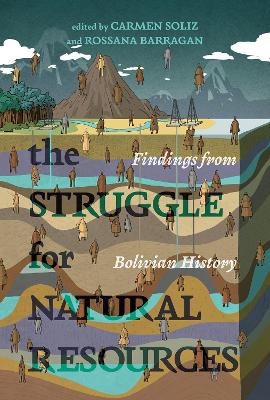
The Struggle for Natural Resources
University of New Mexico Press (Verlag)
978-0-8263-6617-7 (ISBN)
The Struggle for Natural Resources traces the troubled history of Bolivia's land and commodity disputes across five centuries, combining local, regional, national, and transnational scales. Enriched by the extractivism and commodity frontiers approaches to world history, the book treats Bolivia's political struggles over natural resources as long-term processes that outlast immediate political events. Exploration of the Bolivian case invites dialogue and comparison with other parts of the world, particularly regions and countries of the so-called Global South.
The book begins by examining three Bolivian resources at the center of political dispute since the early colonial period, namely land, water, and minerals. Carmen Soliz, Rossana Barragán, and Sarah Hines show that, as in the colonial and early republican past, these resources have remained the focus of political contention to the present day. Until the end of the nineteenth century, Bolivia's battle over natural resources was primarily concentrated in the highlands and inter-Andean valleys. Beginning in the 1860s, the bicycle and soon the automobile industries triggered demand for natural rubber found in the heart of the Amazon. José Orsag analyzes the impact of this extractive economy at the turn of the twentieth century. The book concludes by examining two resources that are central to understanding the last century of Bolivia's history. Kevin Young examines the fraught business of hydrocarbons, and Thomas Grisaffi analyzes the coca/cocaine circuit. Each chapter studies the social dynamics and political conflicts that shaped the processes of extraction, exchange, and ownership of each of these resources.
Carmen Soliz is an associate professor of history and Latin American studies at the University of North Carolina at Charlotte. Rossana Barragán is a professor at CIDES-UMSA La Paz and was a senior fellow researcher at the International Institute of Social History in Amsterdam from 2011 to 2022.
List of Illustrations
List of Tables
Acknowledgments
Introduction
Chapter One. Five Hundred Years of Land Struggle
Carmen Soliz
Chapter Two. From Silver to Tin to Lithium: Five Centuries of Mining in PotosÃ
Rossana Barragán
Chapter Three. Dispossession and Redistribution: Social Struggle over Water
Sarah T. Hines
Chapter Four. The Rubber Boom and Indigenous Territories: Export Economy, Colonization, and the Bolivian Nation-State
José Octavio Orsag Molina
Chapter Five. Smoothing the Contradictions: The Political History of Fossil Fuels
Kevin A. Young
Chapter Six. A Brief History of Coca: From Pre-Columbian Trade to the Cocaine Economy;
Thomas Grisaffi
Epilogue One. The Specter of El Dorado and Extractivism in Bolivian History
Myrna Santiago
Epilogue Two. Commodity Frontiers in Historical Perspective: Lessons from Bolivia
Ulbe Bosma
Bibliography
List of Contributors
| Erscheinungsdatum | 28.02.2024 |
|---|---|
| Reihe/Serie | Diálogos Series |
| Zusatzinfo | 25 figures, 8 maps, 8 tables (41) |
| Verlagsort | Albuquerque, NM |
| Sprache | englisch |
| Maße | 152 x 229 mm |
| Gewicht | 272 g |
| Themenwelt | Geisteswissenschaften ► Geschichte ► Regional- / Ländergeschichte |
| Geschichte ► Teilgebiete der Geschichte ► Kulturgeschichte | |
| Sozialwissenschaften ► Politik / Verwaltung ► Europäische / Internationale Politik | |
| Technik | |
| Weitere Fachgebiete ► Land- / Forstwirtschaft / Fischerei | |
| ISBN-10 | 0-8263-6617-1 / 0826366171 |
| ISBN-13 | 978-0-8263-6617-7 / 9780826366177 |
| Zustand | Neuware |
| Haben Sie eine Frage zum Produkt? |
aus dem Bereich


